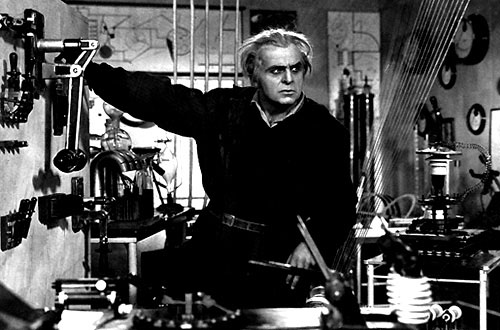
Mad Science
Oscar Handlin argues that scientists have always been seekers of
unsanctioned knowledge. While technology is viewed as relatively benign
(i.e., learning to use a horse collar does not push one to question his
or her beliefs in a divine authority), science, throughout its history,
drags people away from the comfortable folk teachings that undergird
society. Because of this, scientists are and always have been painted
as radicals, heretics, and outcasts whose business is to go where man
ought not to tread. This perception is captured in legendary figures
such as Faust and, in 19th century literature, in characters like
Victor Frankenstein. With the invention of the motion picture, our
culture has found new means of expressing this nervousness regarding
what scientists are up to in their castle laboratories.
Presumably, scientists occasionally go to the movies. Though scientific
literacy among the public appears to be shrinking, science and
scientists remain a common subject of film and television. Sometimes
they are quirky and funny (Back to the Future, The Nutty Professor); at
others, they are monster-makers, figures who push human knowledge too
far (Metropolis, Jurassic Park). Explore the tradition of the scientist
in film. Are film and television improving the popular image of the
scientists, or do they only add to the public’s fear and mistrust of
science?
JSTOR Articles - If you’ve never accessed the JSTOR archives before and
need help, librarians at the reference desk in Cooper should be able to
show you the ropes. Access requires that you be on the Clemson network
or that you provide your login info.
Christopher Tourney, The Moral Character of Mad Scientists: A Cultural
Critique of Science (JSTOR)
http://www.jstor.org.proxy.lib.clemson.edu/stable/20026900?&Search=yes&searchText=technology&searchText=handlin&searchText=science&list=hide&searchUri=%2Faction%2FdoBasicSearch%3FQuery%3Dhandlin%2Bscience%2Band%2Btechnology%26acc%3Don%26wc%3Don&prevSearch=&item=1&ttl=1216&returnArticleService=showFullText
Oscar Handlin, Science & Technology in Popular Culture (JSTOR)
http://www.jstor.org.proxy.lib.clemson.edu/stable/20026900?&Search=yes&searchText=technology&searchText=handlin&searchText=science&list=hide&searchUri=%2Faction%2FdoBasicSearch%3FQuery%3Dhandlin%2Bscience%2Band%2Btechnology%26acc%3Don%26wc%3Don&prevSearch=&item=1&ttl=1216&returnArticleService=showFullText
Theodore Roszak, The Monster and the Titan: Science, Knowledge, and
Gnosis (JSTOR)
http://www.jstor.org/stable/20024217?&Search=yes&searchText=roszak&list=hide&searchUri=%2Faction%2FdoBasicSearch%3FQuery%3Droszak%26acc%3Don%26wc%3Don&prevSearch=&item=4&ttl=1588&returnArticleService=showFullText
Amitai Etzioni, From “Jaws”: A Lovable Scientist (JSTOR)
http://www.jstor.org/stable/1741259?&Search=yes&searchText=jaws&searchText=etzioni&list=hide&searchUri=%2Faction%2FdoBasicSearch%3Facc%3Don%26Query%3Detzioni%2Bjaws%26gw%3Djtx%26acc%3Don%26prq%3Droszak%26Search%3DSearch%26hp%3D25%26wc%3Don%26acc%3Don&prevSearch=&item=1&ttl=24&returnArticleService=showFullText
Here’s an address given by Michael Crichton (writer of The Andromeda
Strain and Jurassic Park) to the AAAS.
Michael Crichton, Why Science is Media-Dumb
http://www.abc.net.au/science/slab/crichton/story.htm
This NSF page outlines some of the results from Margaret Mead’s 1957
survey of schoolchildren concerning what they pictured when they
thought of where, how, and by who science was conducted.
National Science Foundation, Science and Technology: Public
Attitudes and Public Understanding
http://www.nsf.gov/statistics/seind02/c7/c7s3.htm#c7s3l2
Alan Boyle, Why We’re Mad About Mad Scientists (MSNBC)
http://cosmiclog.msnbc.msn.com/_news/2011/01/21/5892849-why-were-mad-about-mad-scientists
Adam Ruben, Experimental Error: Don’t Try This At Home (Science)
http://sciencecareers.sciencemag.org/career_magazine/previous_issues/articles/2010_07_23/caredit.a1000072
John Matson, Worries about LHC black holes resurface (Scientific
American)
http://www.scientificamerican.com/blog/post.cfm?id=worries-about-lhc-black-hole-resurf-2009-01-29
BB Content - PDF Scans of these two resources are available under the
BB site for this course (Course Home Page/Control Panel/Content
Collection/Science & Film)
Christopher Frayling, Mad, Bad, and Dangerous?: The Scientist and the
Cinema (Ch. 1)
Stephen Jay Gould, Review: Jurassic Park

